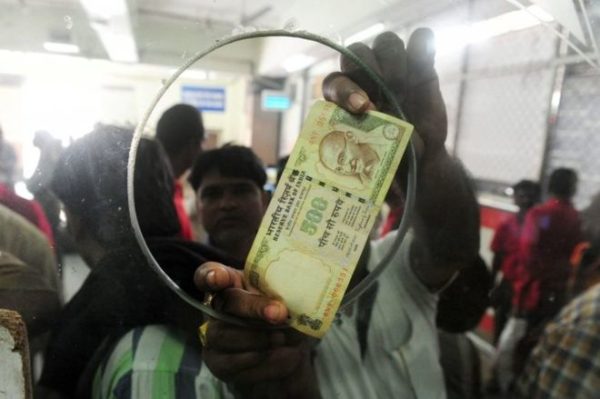India’s dramatic move to scrap 500 ($7.6) and 1,000 rupee notes is poor economics, a leading economist says.
Kaushik Basu, the former chief economist for the World Bank, says the “collateral damage” is likely to outstrip its benefits.
The overnight ban on the notes last week was intended to crack down on corruption and so-called “black money” or illegal cash holdings.
But it sparked scenes of chaos outside banks and ATMs.
Low-income Indians, traders and ordinary savers who rely on the cash economy have been badly hit with hordes thronging banks to deposit expired money and withdraw lower denominations. As the anger mounted, the government raised limits on cash withdrawals on Sunday.
Garlands of money and other images of a cash crisis
How India’s currency ban is hurting the poor
Desperate housewives’ scramble to swap secret savings
‘No customers’: Indians react to currency ban
Holders of notes abroad face tough battle
Can currency ban really curb black economy?
But some economists say the move will have a limited impact as people will simply begin to accumulate black money in the new currency as soon as that becomes available.
The government hopes this will bring cash worth billions of dollars in unaccounted wealth back into the economy. The two notes accounted for more than four fifths of the currency in circulation.
Prof Basu, who now teaches at New York’s Cornell University, says India’s Goods and Services tax, was “good economics, but demonetisation is not”.
“Its economics is complex and the collateral damage is likely to far outstrip the benefits,” he says.
What Prof Basu, who was chief economic adviser to the previous Congress government, means is that this “demonetisation” just witnessed in India is at best, a one-time flushing out of the system and the return of black money is likely if not inevitable.
Many economists say the costs of such a one-time “flush” will be huge.
They say hundreds of thousands of ordinary people (including farmers who do not even have back accounts) who hold cash but not black money will get caught out and the fear of harassment by officials could trap them in a bureaucratic net they don’t know how to deal with.
So it is possible that all this achieves is a sudden curtailment in the total money supply, effectively a kind of contraction of the economy.
‘Helicopter drop’
Economists have long talked about “helicopter drop” of currency – printing large sums of money and distributing it to the public in order to stimulate the economy.
India’s decision to scrap high denomination notes is simply the reverse and according to economist Prabhat Patnaik the government’s move “betrays a lack of understanding of capitalism”.
“Typically, what happens in capitalism in a situation like this is that there would be a new business opening up about how to change old currency notes into new ones… A whole range of people would come up who will say you give us 1000 rupees and we will give you 800 rupees or 700 rupees or whatever. Consequently, instead of curbing black business it will actually give rise to the proliferation of black business,” he told The Wire news site.
But not all experts agree that it is such a risky move.
“India now operates under a monetary policy regime known as inflation targeting. If a portion of the stock of currency in circulation, consisting of currency and demand deposits gets ‘burned’, metaphorically or literally, the Reserve Bank of India, the central bank, can in principle fully offset this through what economists call ‘open market operations’,” Vivek Dehejia says.
“These involve purchasing bonds from the markets and injecting money (and therefore liquidity) into the markets in return. This is standard operating procedure for central banks.”
To put it more simply: suppose a warehouse of cash owned by someone goes up in flames and the money stock drops. The central bank, economists say, can augment the money stock.
The loser is the individual whose money went up in flames – in other words, by analogy, someone holding illicit unaccounted cash that cannot be converted into new currency or deposited.
“There will be short run adjustment costs as the old notes are replaced by new ones, but I see no medium to long term impacts on growth, inflation or other pertinent macroeconomic variables,” says Prof Dehejia.
“The gains will be a one-time tax on black money and a possible disincentive for future black money accumulation, in the event that there is a prospect for future demonetisations.”
He, for one, is confident this move will achieve what it needs without damaging the economy.



Leave a reply